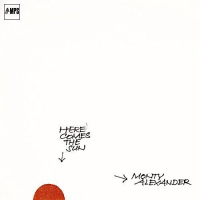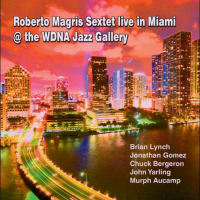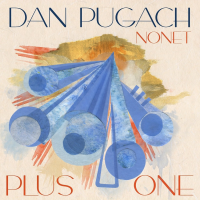Home » Jazz Articles » Bailey's Bundles » Formats – Solo Through Nonet
Formats – Solo Through Nonet
 Solo: Jamie Saft
Solo: Jamie Saft Solo a Genova
RareNoise Records
2018
That musical provocateur Jamie Saft, he is a prankster. After making all kinds of noise with the likes of Metallic Taste of Blood, Slobber Pup, Plymouth, Red Hill, The Spanish Donkey and Berserk! and Avant Gard jazz with Steve Swallow, Bobby Previte, Roswell Rudd, and Bill Brovold, the devil delivers a perfectly acceptable, if not gorgeous, solo piano recital celebrating the American Spirit in music. Saft claims that this is his first proper solo release in a quarter-century of recording. It sounds long overdue to me. That said, this is no simple recital of the Great American Songbook. There is not on Tin Pan Alley Standard within a light-year of this recording and only two "jazz" standards: a shimmering performance of John Coltrane's "Naima" and a most introspective (if it could be any more so) take on Bill Evans' "Blue in Green." And these are perhaps the two most traditional performances on the record, acting as the seasoning to something much more complex.
Saft selects two Bob Dylan tunes: "Po' Boy" (from Love and Theft (Columbia, 2001)) and "Restless Farewell" (from The Times They are A-Changin' (Columbia, 1964)). The former is presented as a slightly Saturday Night/Sunday Morning saloon song, while the latter is a fecund pastoral. There is also Joni Mitchell ("Blue Motel Room: from Hejira (Asylum, 1976)), Stevie Wonder ("Overjoyed" from In Square Circle (Motown, 1985)), and Curtis Mayfield ("The Makings of You" from Curtis (Curtom, 1970)). But the real eye-opener here is Saft's classical assault on ZZ Top's "Sharp Dressed Man." Brooding and ponderous, Saft transforms this 1980s worship of braggadociousness into a densely dark dirge of anxiety that merges well with his interpretation of Charles Ives' "The Housatonic at Stockbridge." Saft's recording captures all of the dense solitude of any solo recital, transformed by the excellent sonics of the tank-sized Steinway piano he played, making this entire collection one of the most provocative releases this year.
 Duo: Frank Carlberg & Noah Preminger
Duo: Frank Carlberg & Noah Preminger Whispers and Cries
Red Piano Records
2018
Simply by definition a solo act cannot be considered "intimate." It takes two to be so, making the jazz duo the most intimate of performance format settings. Pianist Frank Carlberg and tenor saxophonist Noah Preminger provide a working example with their release Whispers and Cries. The intimacy shared here is a mutual intellectual playfulness informed by years of musical study and performance with a bit of postmodern deconstruction thrown in for good measure. While the performance of this even ten time-honored standards recalls some of the more probing duo interactions between pianist Martial Solal and alto saxophonist Lee Konitz (e.g., Star Eyes, Hamburg 1983 (HatOLOGY, 1998)), Carlberg and Preminger's deconstructions remain colored within the lines, making Whispers and Cries a wholly satisfying listening experience.
Carlberg and Preminger establish from the beginning that they are not interested in a "straight" performance of these classic tunes. No, they are interested in exploration within the boundaries of recognition, and enjoying themselves while they do it. This is most evident immediately on "Someone To Watch Over Me," in which Carlberg provides an impressionistic and abstract introduction that barely betrays the song's identify until Preminger states it definitively. As the two artists play their way through the ten selections contained herein, they purposely allow the melodic and rhythmic structures to unravel in an unplanned, purely improvisational manner. From George Gershwin the pair proceed to Billy Strayhorn's "Take the 'A' Train." Here things become even more abstract with the original melody deftly hiding within the playing. This continues through the usual suspects: "Embraceable You," "The Meaning of the Blues," and "These Foolish Things" before reaching a critical mass on "Try A Little Tenderness," which will challenge the best listener. Reading William Faulkner requires an effort from the reader, one that is paid off if that effort is expended. The same is true with these chestnuts played by Carlberg and Preminger.
 Trio: David Liebman—Tatsuya Nakatani—Adam Rudolph
Trio: David Liebman—Tatsuya Nakatani—Adam Rudolph The Unknowable
Rare Noise Records
2018
The traditional jazz trio: piano, bass, and drums is perhaps the most durable of all performance formats. So much so that writers and musicians alike refer to it at "the rhythm section." That said, David Liebman, Tatsuya Nakatani, and Adam Rudolph comprise a very different type of jazz trio, that of a melody instrument (Liebman's various winds and reeds) with Nakatani's various traditional and non-traditional percussion instruments and Rudolph's nor non-traditional percussion instruments for their recording The Unknowable. That this is a RareNoise project ups the ante on expectations that are largely met by this suite-like collection of compositions. The three principals bandy about phrases like: "beautiful alchemy," "living life with sound spirit world," "voodoo of spontaneous high level musical communication," and "spontaneous composition." For totally improvised programs like The Unknowable I am not sure that "spontaneous composition" is anything new in jazz and other improvised music. That said, this is not musicians playing a standard and then improvising on it. The entire process is improvised in the spirit of "improvised form." It is like a crazy fifth dimension telepathy that when one hears it, the listener immediately understands the life accomplishments of the musicians involved.
The recording consists of 13 selections, with the opening and closing appropriately being titled "Benediction" in keeping with "living life with sound spirit world" thread of thought. All of the selections, necessarily percussion heavy, possess at once a tropical and sub-Saharan flavor and feel. Liebman's presence readily recalls John Coltrane's late music minus the chaotic "sheets of sound." There is sound and often sheets of it, but its special organization fortunately lacks the density of Coltrane's Gotterdammerung period. The musicians employ an array of instruments such as gongs, a thumb piano, a mbuti harp, slit drum, as well as the somewhat standard Fender Rhodes and tenor and soprano saxophones. I am unsure if anything new is being presented here save for the large special element of the music. But is the listener can suspend their usual expectations (and I speak largely for myself here) there is much to appreciate and realize in this recording that can make one better understand the earlier music by the Jimmy Giuffre Trio in the 1960s. Forget trying to "understand" the music, simply be grateful for it.
 Quartet: Monty Alexander
Quartet: Monty Alexander Here Comes the Sun
MPS Records
2018/1971
Musik Produktion Schwarzwald (MPS) was a German jazz record company and label founded in 1968 by Hans Georg Brunner-Schwer. This was the first German record label to release exclusively jazz. MPS releases were notable for the high quality of the recordings, with some of the production being conducted in the private atmosphere of label founder's living room. Detailed liner notes and thoughtfully conceived cover art made these releases something special. One of a spate of MPS recordings (originally recorded in the early 1970s) being re-released digitally and on compact disc is Jamaican pianist Monty Alexander's Here Comes the Sun. I have it representing the jazz quartet format as a ringer in that in addition to the standard jazz piano trio made up here of pianist Alexander, bassist Eugene Wright and drummer Duffy Jackson, we have percussionist Montego Joe giving the recording a decidedly Caribbean humidity and aroma.
Monty Alexander became noted as a jazz pianist in the mode of Gene Harris and Oscar Peterson with his Concord Jazz releases in the 1980s and '90s and his Telarc releases in the 2000s. His piano style is two-fisted, block chords not unlike Red Garland save for the distinct Island flavor his music has. The title piece is George Harrison's composition form the Beatles' Abbey Road (Apple, 1969) album. Alexander adds piquant jerk seasoning to the song, making it just enough his own to let us know he put thought into it. The pianist melds the Gershwin Brothers' classic "Love Walked In" with the ultra-Calypso "Brown Skin Girl" (sounding like a modern Vince Guaraldi) perfectly capturing Alexander's place in both the American Jazz tradition and as a purveyor of the Island sound, skillfully marrying the two in the included seven selections. He tops all with a percussive reading of Miles Davis's "So What" capping a very entertaining recording.
 Quintet: Keith O'Rourke
Quintet: Keith O'Rourke Sketches from the Road
Chronograph Records
2018
Representing the five-member format, the quintet is Canadian tenor saxophonist Keith O'Rourke with his debut recording Sketches from the Road. O'Rourke choses the durable and time-tested quintet of a standard piano jazz rhythm section fronted by trumpet and saxophone (think Miles Davis and Art Blakey). Recently graduated with a degree in Music Performance in classical saxophone, O'Rourke took to the road, assimilating his experiences in these eleven cerebrally-composed originals. O'Rourke writes and performs a sleek brand of bop that, while a throwback, completely benefits from the modern digital sonic perfection available with contemporary recording methods. What this amounts to is a sanitizing the 1950s and '60s sound of era Blue Note recordings. This is an observation, not a criticism. The fried chicken fat and canned beer sound of Jimmy Smith or the well-scotch and Chesterfields sound of the The Jazz Messengers could only have happened when they did and to whom they did.
O'Rourke and trumpeter Andre Wickenheiser perform their parts well and their performances are recorded honestly right down to the Stan Getz low register reedy rasp and the Chet Baker vibratoless brass. The breathiness of the delivery from both horns is captured with great immediacy, adding to the overall "intimacy" of the recording. The rhythm section of pianist Jon Day bassist Kodi Hutchinson, and drummer Tyler Hornby provide the horns a shimmering harmonic blanket on which to perform, while soloing capably themselves. I pick out "Lost Blues" as a representative example of these fine performances. It has the traditional head-soloes-head-coda form coupled with a complex introduction and chord sequence. Everything about this recording is enjoyable and it will be interesting what O'Rourke will do next.
 Sextet: Roberto Magris
Sextet: Roberto Magris Live in Miami @ the WDAN Jazz Gallery
JMood Records
2018
Italian pianist and composer Roberto Magris has become a jazz mainstay in his native land and abroad. A musical curator of the hard bop flame, Magris released several surveys of the music, including Mating Call (2010), Morgan Rewind: A Tribute to Lee Morgan Vols. 1 & 2 (2012, 2013) and One Night in With Hope and More...Vols. 1 & 2 (2012, 2013). The second musical front Magris has been addressing is the rediscovery of overlooked masters as in the releases of Sam Reed Meets Roberto Magris: Ready For Reed (Jmood, 2013) and An Evening with Herb Geller & the Roberto Magris Trio: Live in Europe 2009 (Jmood, 2015). His interests did not stop there as evidenced by the present live recording of his sextet at Miami's WDNA Jazz Gallery.
Live in Miami is a good, old fashioned hard bop blowing session: a "cooker" in the vernacular. Magris augments the classic hard bop quintet (trumpet/tenor saxophone) with congas performed by percussionist Murph Aucamp. This strategic choice augments Magris' own Sub-Saharan centered compositions, "African Mood" and "Song for an African Child" while adding a piquant touch to his simmering "What Blues. "Trumpeter Brian Lynch and tenor saxophonist Jonathan Gomez capably fill out Magris' "wall of sound" well spackled by Aucamp. The standards included here are Rahsaan Roland Kirk's "April Morning" and Billy Strayhorn's "A Flower is a Lovesome Thing," ballads both capably addressed by the band. All of the selections are given lengthy consideration making this a pleasant and surprising listening experience.
 Septet: Tim Solook
Septet: Tim Solook Jacksonville Road
Sol-Time Records
2018
Our septet entry is this survey is by none other than the Houston Jazz Mafia's consiglieri drummer Tim Solook with the help of caporegimes guitarist Paul Douglas Chester and trumpeter Dennis Dotson. Solook last released the self-produced Comfortable Blues in 2013 to favorable reviews. The drummer favors smart hard bop with a contemporary flair, a preference that extends to the present Jacksonville Road. For this recording, Solook rounds his band out with keyboard/piano players Andrew Lienhard and Bob Henschen, bassit David Craig, and saxophonist Warren Sneed, all who are integral to this recording.
Solook is the sole composer of the eight pieces making up this recording. The opening "Your Turn" could have been found on a 1950s Hank Mobley or Lee Morgan Blue Note masterpiece. The era is betrayed by Chester's ultra-slinky guitar playing that gives the piece that important current flavor. Trumpeter Dodson and saxophonist Craig turn in carefully crafted solos recalling a golden age in jazz sound. Henschen's piano skirts a certain blues flavoring without ever falling into a churchy cadence. "Easy on the Eyes" features Chester playing octaves over a slightly Latin vibe. That vibe goes full bore on "Surprise' again giving Chester a spotlight on his fine guitar playing. Bassist Craig displays his elastic electric bass on the better part of these contemporary jazz compositions. Solook's drumming is precise and well measured, couching perfectly his compositions. This music's time has come.
 Dave Brubeck Octet
Dave Brubeck Octet Dave Brubeck Octet
Fantasy Records
2018
I am not above chicanery. I did not have a good example of octet format jazz readily at hand and so I went to an old standby, Dave Brubeck Octet. Originally released in 1956, the 18 selections on the album were recorded between 1946 and 1950 (though www.jazzdisco.org reports these recordings being made in 1948 and 1950), well before the breakout Time Out (Columbia, 1959). To be sure, Brubeck had it going on early. Of perhaps greater interest is that about half of the pieces on this release were recorded before Miles Davis' famous Birth of the Cool (Capitol) nonet recordings, because tonally, both sets of recordings sound very similar in style and construct. The opening "The Way You Look Tonight" is downright contrapuntal in its structure. "Love Walked In" and "What is this Thing Called Love" follow very closely.
The compositions and performance take on a future Modern Jazz Quartet classical feel in "Prelude" and "Fugue on Bop Themes," both revealing a solid genius in orchestration and arrangement. The latter of these pieces recalls the contrapuntal interplay heard in the traditional jazz from New Orleans, only more modern. "Schizophrenic Scherzo" is nothing but fun, recalling Mozart's famous "Ein musikalischer Spaß," K. 522 ("A Musical Joke") in timbre and intention. "How High the Moon," the great bop vehicle for Charlie Parker is painted lushly in arrangement here, sounding years ahead of its time. "You Go to My Head" is turned on its ear with its tonally complex introduction giving way to William Smith's superb clarinet. Curve ball or not, a reconsideration of this recording was in order.
 Dan Pugach Nonet
Dan Pugach Nonet Plus One
Unit Records
2018
It would have been too easy to pull another fast one and slip Davis' previously mentioned nonet recordings here save for drummer Dan Pugach's Nonet Plus One which I am still considering a nine-piece combo. Like Tim Solook above, Pugach is an ace composer and arranger. It is pretty incredible to realized that Nonet Plus One is the drummer's debut recording. It sounds fully formed and completely evolved. Pugach employs two pianists: Carmen Staaf and Jorn Swart, each anchoring Pugach's sound in different ways, Swart with a double-fisted assertive approach and Staaf taking a more introspective road there. With that, the drummer gets the most out of his little-big band, which, at times shimmers and shakes.
The Plus One of the recording is vocalist Nicole Zuraitis, who interprets Dolly Parton's "Jolene" over Pugach's crack charts, featuring the bass clarinet of Andrew Gutauskas. This is solid music, durable and progressive. If this is Pugach just getting started, it will be most fun and enjoyable to see him get where he is going.
< Previous
Solo Contra
Comments
Tags
Bailey's Bundles
Jamie Saft
C. Michael Bailey
Metallic Taste of Blood
Slobber Pup
Plymouth
Red Hill
The Spanish Donkey
Berserk!
Steve Swallow
Bobby Previte
Roswell Rudd
Bill Brovold
John Coltrane
Bill Evans
Bob Dylan
Frank Carlberg
Noah Preminger
Martial Solal
Lee Konitz
George Gershwin
Billy Strayhorn
Monty Alexander
Eugene Wright
Duffy Jackson
Montego Joe
Gene Harris
oscar peterson
Red Garland
Vince Guaraldi
Miles Davis
Jimmy Smith
Jazz Messengers
Stan Getz
Chet Baker
Jon Day
Kodi Hutchinson
Tyler Hornby
Roberto Magris
Murph Aucamp
Brian Lynch
Jonathan Gomez
Tim Solook
Paul Chester
Dennis Dotson
Andrew Lienhard
Bob Henschen
David Craig
Warren Sneed
Hank Mobley
lee morgan
Charlie Parker
William Smith
Dan Pugach
Carmen Staaf
Jorn Swart
Andrew Gutauskas
For the Love of Jazz
 All About Jazz has been a pillar of jazz since 1995, championing it as an art form and, more importantly, supporting the musicians who create it. Our enduring commitment has made "AAJ" one of the most culturally important websites of its kind, read by hundreds of thousands of fans, musicians and industry figures every month.
All About Jazz has been a pillar of jazz since 1995, championing it as an art form and, more importantly, supporting the musicians who create it. Our enduring commitment has made "AAJ" one of the most culturally important websites of its kind, read by hundreds of thousands of fans, musicians and industry figures every month.


















